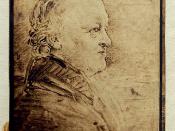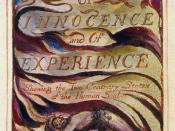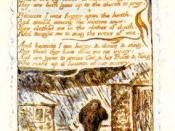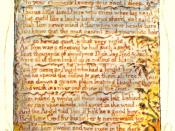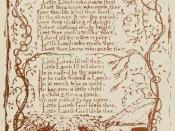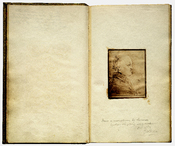In the XVIII century the industrial revolution in England increased radically the demand for work force. This situation made many countryside families emigrate looking for better life conditions in the industrialized cities. However; what they found was confinement inside the walls of factories where greedy owners did not want to pay workers high wages. Children were neither big nor educated enough to argue or complain and were small enough to fit between machinery gaps where adults couldn't; moreover they were paid cheaply, therefore children became ideal workers.
Not only were these children subjected to long hours, but also to horrible conditions. There were many accidents where children were injured or killed. The treatment in factories was often cruel and unusual; they would be beaten, verbally abused or subjected to different kinds of pain inflection.
William Blake was aware of the poverty and oppression of the urban society where he spent most of his life.
He had an amazing insight into contemporary economics and politics, and was able to discern the effects of the authoritarianism of church and state.
As a critic of his time Blake took an active role in exposing the corruption taking place in his society. He was inspired by the inhumane treatment of young boys called "chimney sweeps." Thus he produced a protest with his poetry.
The chimney sweeps began their days long before sunrise until about noon when they shout in the streets for more work. When it was time to return, these young boys carried heavy bags of soot to the cellars and attics where they slept. Even the task of sleeping was a torture. The boys owned nothing and their employers gave them very little money leaving them with only the bags of soot which they used as beds.
In 1789 William Blake published his poem collection Songs of Innocence where he dramatized the naive hopes and fears that evidence the lives of children.
"Blake might be considered a romantic who cultivates love towards childhood and innocence, not as something apart and unique but as an element of social relationâ¦" (Blake: 17)This collection belongs to the pastoral popular tradition or lullabies.
Songs of Experience was first advertised in 1793, before being rebound together with Songs of Innocence the following year. The poems of Experience are darker in tone and outlook, the innocence of its counterpart seems to have turned into experience.
The first lines in The Chimney sweeper from Songs of Innocence are very striking for a little boy has lost his mother and his father has sold him like a piece of merchandise; the poet appeals to the reader's empathy with the use of these strong images.
The first stanza explains why the poetic voice lives his life in misery.
"When my mother died I was very young,And my father sold me while yet my tongue,Could scarcely cry weep weep weep weepSo your chimneys I sweep & in soot I sleep." (1-4)The word weep besides the sound of a baby crying also regards the way children were too young to pronounce sweeps correctly. "The lisping little children pronounce; 'sweep' as 'weep.'" (Bloom: 20)The crudeness in these lines is a sign of displeasure at a society who puts a child in such a pitiful situation.
In the second stanza the poet introduces a second chimney sweeper called Tom Dacre who cries his fate while his head is being shaved; the poetic voice tries to comfort him by showing him a positive way to see his misfortune.
"Hush Tome never mind it, for when your head's bare,You know that the soot cannot spoil your white hair."(7-8)Besides portraying a child who has given up to his fate and tries to carry on with it, the poet sets in these lines, for the first time in the poem, the opposition between black and white as an analogy of sin in contrast with purity.
In the third stanza Blake start to deepen into the use of imagery with the description of Tom's dream.
"â¦thousands of sweepers Dick, Joe Ned & JackWere all of them lock'd up in coffins of black"(11-12)Here the "coffins of black" evoke the black chimneys where chimney sweeps find suffering and death. As the dream goes on an angel comes and rescue them. Tom sees himself in a green plain with a river under the sun; what should be a regular day for a child represents the paradise for little chimney sweep Tom Dacre. Before the dream ends the angel gives Tom hope of happiness in heaven when he dies if he is a good boy and carries out with his duties. This dream implies a mockery to the England Church that was indifferent before abused children; moreover it did not even allow chimney sweeps enter the catholic temples. The angel's promise would mean that the chimneys should accept their fate and have resignation if they want to be in heaven when they die. This is read not only as a critique to Church but also to the catholic religion itself.
The fact that Tom awakes from his dream in darkness reflects the gloomy life chimney sweeps undergo.
"And Tom awoke and we rose in the darkAnd got with our bags & our brushes to work." (21-2)Towards the end of the poem Blake points out the naïve innocence of the chimney sweeps who believed in the angels promise. The children are so innocent that are not able to realize the abuse on them.
"Tom was happy & warm,So if all do their duty, they need not fear harm. (23-4)The critique goes on through the end of the poem; the Church did not only pretend the chimneys to have resignation but also be joyful about it.
The Chimney Sweeper in Songs of Experience, unlike its counterpart in Songs of Innocence, is well aware of his victim condition; the poetic voice is no longer a naïve boy telling a younger chimney sweeper's dream, but one who describes his own life. He is black by the soot and has no name; he is just a "little black thing," in the snow (1) crying "`weep! 'weep!' in notes of woe!"(8). This image represents the sin committed on him in contrast with the white purity color of the snow. Different from the version in Songs of Innocence, this poem does not disguise the hopeless nature of the young sweeper's cries. In the same first stanza Blake points at parents neglect and link it with the church when the boy is asked about his parents.
"They are both gone up to church to pray.
Because I was happy upon the heath,And smil'd among the winter snow:(4-6)In spite of the misery that represented to be a chimney sweeper, some poor families sent their boys to work in order to have an extra income; the soot covering the chimney sweeps evokes the black clothes used in funerals.
They clothed me in the clothes of death,And taught me to sing the notes of woe."(7-8)The child undergoes a slow and miserable death as a chimney sweeper. The irony is explicit since those that are supposed to be virtuous in society neglect their responsibilities; those that are supposed to be the guardians of children become the antithesis of security and refuge. Through this critique, the poet exposes the hypocrisy of society.
With these poems William Blake protested against the living and working conditions, and the overall treatment of young chimney sweeps in the cities of England. In Songs of Innocence, the boy sees his situation through the eyes of innocence and does not understand the social injustice. In Songs of Experience, the boy is aware of the injustice he suffers and speaks against the establishments that left him where he is. Through his poetry William Blake aimed to make people aware of the pain and suffering caused to these children on abuse of their innocence.
Bibliography:Blake, William. Songs of Innocence and Experience. Ed. José Luis Caramés. Madrid: Cátedra, 1997Bloom, Harold and Lionel Trilling. The Oxford Anthology of English Literature. Ed. Frank Kermode, John Hollander, et al. Vol. II. New York: Oxford University Press, 1973Merriman,C.D. "William Blake Biography". The Literature Network. 2006 [internet][Ref.2 de Nov. 2008] http://www.online-literature.com/blake/
